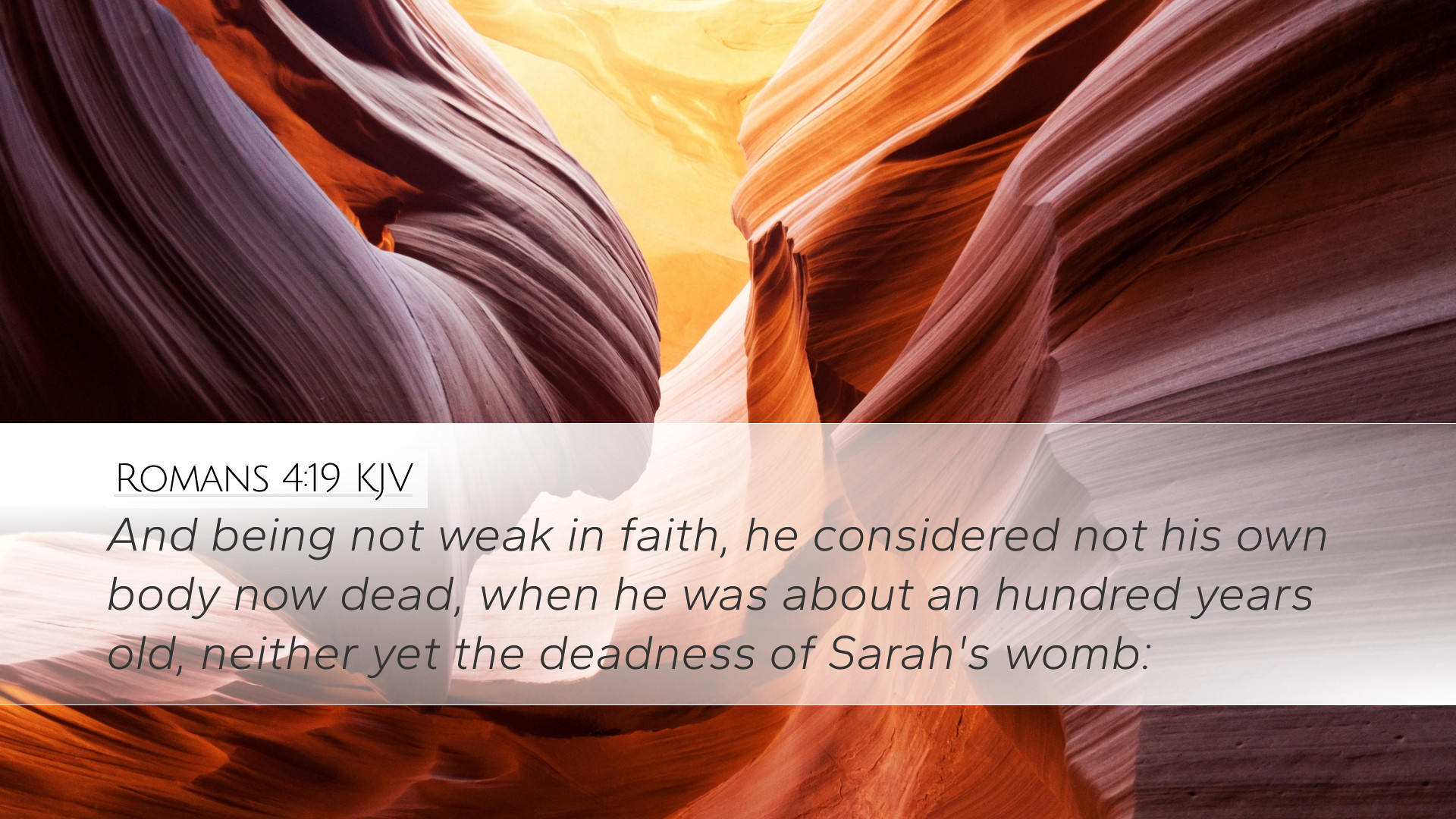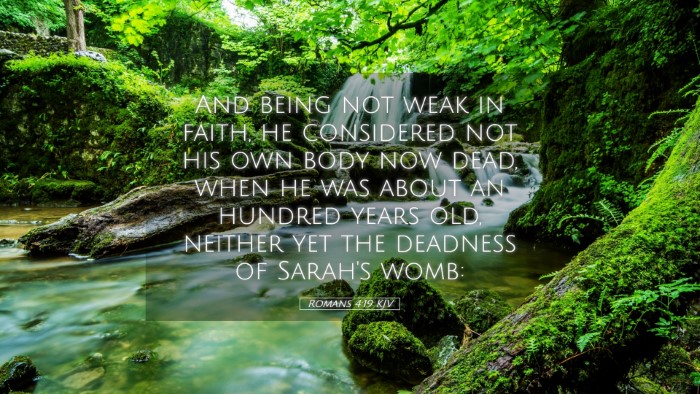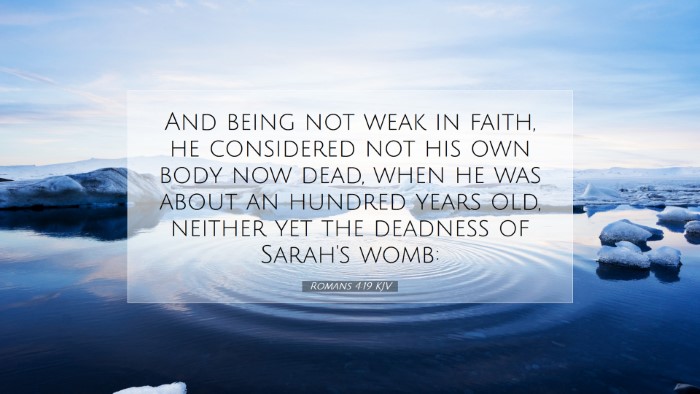Old Testament
Genesis Exodus Leviticus Numbers Deuteronomy Joshua Judges Ruth 1 Samuel 2 Samuel 1 Kings 2 Kings 1 Chronicles 2 Chronicles Ezra Nehemiah Esther Job Psalms Proverbs Ecclesiastes Song of Solomon Isaiah Jeremiah Lamentations Ezekiel Daniel Hosea Joel Amos Obadiah Jonah Micah Nahum Habakkuk Zephaniah Haggai Zechariah MalachiRomans 4:19
Romans 4:19 KJV
And being not weak in faith, he considered not his own body now dead, when he was about an hundred years old, neither yet the deadness of Sarah's womb:
Romans 4:19 Bible Commentary
Commentary on Romans 4:19
Verse Text: "And being not weak in faith, he considered not his own body now dead, when he was about a hundred years old, neither yet the deadness of Sarah's womb."
Introduction
This verse forms a critical part of Paul's argument in Romans regarding faith, righteousness, and the promises of God, drawing a vivid example from the life of Abraham. Commentators have long explored the theological and practical implications of Abraham's faith as depicted here, presenting a rich well of insights valuable for pastors, students, theologians, and Bible scholars.
Faith and Human Limitation
Matthew Henry emphasizes the contrast between human limitation and divine capability. He remarks on Abraham's age and the barrenness of Sarah as significant barriers, illustrating that true faith considers not the shortcomings of the flesh but rests entirely on the promises of God. Abraham's age, a metaphor for human inability, signifies that faith transcends natural circumstances.
Henry states, "Abraham did not stagger at the promise of God through unbelief; but he was strong in faith, giving glory to God." This conviction supports the understanding that real faith is not contingent on human reasoning or visible potential but hinges on divine assurance.
The Role of Consideration in Faith
Albert Barnes focuses on the phrase "considered not his own body." He elucidates that this reflects a choice of faith over doubt. By choosing not to focus on the reality of his circumstances, Abraham exemplifies a powerful lesson on the selective nature of faith. To walk by faith, one must often disregard the discouraging facts that the world presents.
Barnes elaborates, "Abraham's faith was not weakened by the difficulties of his condition; rather, he believed that God was able to fulfill His promise regardless of the physical limitations." This aspect of faith involves a deliberate decision to center one's thoughts on God's truth rather than on personal limitations or external challenges.
Divine Promise vs. Human Despair
Adam Clarke provides depth by connecting this passage to the overarching biblical theme of hope amidst despair. He interprets Abraham's unwavering faith as an essential model for believers, especially when faced with impossible situations. Clarke notes the importance of recognizing God's previous faithfulness in lesser trials as a foundation for trust in greater promises.
He writes, "Abraham had grounds to rest on; God had spoken, and that word was all that was needed for him to trust despite the apparent impossibilities." Clarke highlights that the remembrance of God's past mercies fuels present faith, allowing believers to look beyond their immediate circumstances.
Implications for Believers
The implications of Romans 4:19 extend into the lives of modern believers. This verse serves as a powerful reminder of the nature of faith, emphasizing resilience in the face of life's challenges and the ability to strengthen one's belief through reliance on God's promises.
- Faith in the Face of Challenges: Believers today are encouraged to adopt Abraham's attitude when approached with seemingly insurmountable obstacles, whether personal, relational, or spiritual.
- Recollection of God's Promises: Like Abraham, Christians are reminded to recall God's track record in their lives as a basis for enduring trust.
- Transformation through Faith: This passage inspires faith that transforms individuals, prompting them to live not by sight but by the unwavering assurance that God fulfills His promises.
Theological Reflection
The theological implications of Romans 4:19 are profound. The concept of faith as an active, sustained trust in God’s character rather than mere intellectual assent is a critical doctrine in Christian theology. Paul uses Abraham as a paradigm, arguing that righteousness comes through faith, established long before any law was given.
Henry, Barnes, and Clarke collectively express that this faith is not passive; it requires engagement and a decision to fix one’s gaze on God rather than on human limitations. This reflects an eternal truth about God’s nature—He is faithful to His word, and our confidence in that truth must be unwavering.
Conclusion
In summary, Romans 4:19 serves as a powerful exemplification of faith that surpasses human understanding. The insights from Matthew Henry, Albert Barnes, and Adam Clarke collectively build a comprehensive view of how Abraham's faith can guide modern believers in their spiritual journeys. This verse invites deep reflection on how faith operates amidst the realities of life, calling all to trust in the unchanging promises of God.


